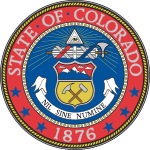| |||||||||||||
| |||||||||||||
| Elections in Colorado |
|---|
 |
The 2016 Colorado Republican presidential caucuses took place in early April in the U.S. state of Colorado, as a part of the Republican Party's series of presidential primaries ahead of the 2016 presidential election. The Colorado contest consisted of a series of congressional district conventions on April 2, 7 and 8 and a state convention on April 9. A non-binding "beauty contest" caucus was held March 1 to coincide with the Super Tuesday conventions. Ted Cruz won a majority of delegates in the convention.
Background
In the 2012 contest, Colorado held a caucus in order to determine delegate allocation, although the state had traditionally held a non-binding caucus.[citation needed] While the state's Republican Party attempted to hold the traditional non-binding straw poll in 2016 as well, the national GOP prohibited states from holding non-binding straw polls in the 2016 election.[1] In addition, a bill in the Colorado Senate to create a preference primary died in committee.[2]
The state of the campaign
Despite an early victory by Ted Cruz in the Iowa caucuses, Donald Trump was seen as making steady progress towards the Republican nomination at the time. Trump was victorious in 7 of the contests on March 1, with Cruz seen as the only viable threat to Trump after victories in his home state of Texas and 3 other March 1 contests. Marco Rubio performed worse than anticipated on March 1, taking only Minnesota. On March 8, two primaries and a caucus were held in Hawaii, Michigan and Mississippi. Despite a poll from American Research Group that showed Kasich leading Trump in Michigan, Trump won all three contests.[3][4]
On March 15's primaries, Donald Trump took four of the five contests- Florida, Illinois, Missouri and North Carolina. Trump however was defeated in Ohio by John Kasich 2016 presidential campaign, losing all 66 of the state's delegates. Marco Rubio suspended his campaign after losing the Florida contest,[5] leaving just Cruz and Kasich in the race to oppose Trump.
On March 22, Trump won the Arizona contest and all of its 58 pledged delegates, while Cruz capitalized on Trump's comments critical of Mitt Romney's Mormon faith[6] to take the state of Utah and its 40 delegates.
On April 1–3, the North Dakota state convention was held. Capitalizing on a weak ground operation by Donald Trump, Ted Cruz claimed the support of 18 uncommitted delegates to just 1 for Trump.[7] This was considered especially important for Colorado, as neither state had a preference primary and delegates were assigned at state and district conventions.
District conventions
1st and 6th district conventions
The district conventions for the 1st and 6th districts took place on April 2. The District 1 slate included former Secretary of State Scott Gessler, state Representative Justin Everett and Tony Sanchez, a candidate for state Senate. All three of the delegates were committed to Cruz- Gessler on the Cruz ticket and the other two on that of the Rocky Mountain Gun Owners.[8] The District 6 slate included John Carson, Randy Corporon and Regina Thomson. All three delegates were on the official Cruz slate and were endorsed by Gun Owners of America.[8][9]
7th district convention
The district convention for the 7th district took place on April 7. Cruz exploited a superior ground game to push forward his slate of Anil Mathai, Libby Szabo and George Athanasopoulos, although only Szabo is officially pledged for Cruz.[10][11] The 7th district was the first convention in which Trump supporters succeeded in assigning a slate of pledged delegates, although they were defeated by the Cruz supporters.[10]
2nd, 3rd, 4th and 5th district conventions
The district conventions for the 2nd, 3rd, 4th and 5th districts took place on April 8. The 3rd district, 4th district and 5th district district conventions all ended up with a full slate of Cruz-supporting delegates.[11] These included Melanie Sturm, Anita Stapleton and Brita Horn in the 3rd district, Perry Buck, Guy Short and Kendal Unruh in the 4th district and Joel Crank, Robin Coran and Donald Olmstead in the 5th district.[11] The 2nd district convention appointed one Cruz delegate, Robert Woodward, and two unpledged delegates, Michael McAlpine and Marty Neilson.[11] The conventions were seen to be a large boost to Cruz, and Trump's sloppy organization was seen as a significant obstacle he would have to overcome in order to win the nomination.[12]
State convention
The state convention took place on April 9. Ted Cruz spoke directly at the state convention, whereas Donald Trump received an invitation but did not attend and John Kasich sent former Governor of New Hampshire John Sununu to speak on his behalf.[12][13] Cruz took all 13 delegates at the state convention, completing a sweep of all 34 delegates in Colorado as well as the 3 unpledged RNC delegates (although 7 of them were officially uncommitted, they were all seen as leaning for Cruz.)[13]
Polling
| Poll source | Date | 1st | 2nd | 3rd | Other |
|---|---|---|---|---|---|
| Quinnipiac University Archived 2015-11-22 at the Wayback Machine
Margin of error: ± 4.5% Sample size: 474 |
November 11–15, 2015 | Ben Carson 25% |
Marco Rubio
19% |
Donald Trump
17% |
Ted Cruz 14%, Carly Fiorina 5%, Rand Paul 3%, Jeb Bush 2%, Chris Christie 1%, John Kasich 1%, Mike Huckabee 1%, Bobby Jindal 1%, Lindsey Graham 0%, Rick Santorum 0%, George Pataki 0%, Jim Gilmore 0%, DK/NA 11% |
| Suffolk University Archived 2015-01-25 at the Wayback Machine
Margin of error: ± ?% Sample size: 205 |
September 2014 | Rand Paul 12.25% |
Paul Ryan 10.29% |
Chris Christie/Mike Huckabee 8.33% |
Scott Walker 7.84%, Marco Rubio 7.35%, Jeb Bush 6.37%, Bobby Jindal 5.88%, Ted Cruz 5.39%, Rick Perry 5.39%, Rick Santorum 2.45%, John Huntsman 1.47%, John Kasich 0.49%, Refused 0.49%, Other 1.96% |
| Magellan Strategies
Margin of error: ± 6% Sample size: 270 |
April 14–15, 2014 | Rand Paul 17% |
Mike Huckabee 16% |
Ted Cruz 14% |
Chris Christie 12%, Marco Rubio 10%, Jeb Bush 9%, Scott Walker 8%, John Kasich 2%, Undecided 12% |
| Public Policy Polling
Margin of error: ± 6.1% Sample size: 255 |
March 13–16, 2014 | Ted Cruz 17% |
Mike Huckabee 15% |
Chris Christie 14% |
Rand Paul 10%, Paul Ryan 10%, Jeb Bush 8%, Marco Rubio 8%, Scott Walker 5%, Bobby Jindal 2%, Other/Undecided 11% |
| Public Policy Polling
Margin of error: ± 5.2% Sample size: 355 |
December 3–4, 2013 | Ted Cruz 18% |
Chris Christie 17% |
Rand Paul 16% |
Marco Rubio 10%, Paul Ryan 9%, Jeb Bush 8%, Scott Walker 6%, Bobby Jindal 3%, Rick Santorum 2%, Other/Undecided 11% |
Results
| Candidate | Votes | Percentage | Actual delegate count | ||
|---|---|---|---|---|---|
| Bound | Unbound | Total | |||
| Ted Cruz | 0 | 0.0% | 17 | 4 | 21 |
| Donald Trump | 0 | 0.0% | 0 | 0 | 0 |
| John Kasich | 0 | 0.0% | 0 | 0 | 0 |
| Marco Rubio (withdrawn) | 0 | 0.0% | 0 | 0 | 0 |
| Ben Carson (withdrawn) | 0 | 0.0% | 0 | 0 | 0 |
| Uncommitted | 0 | 0.0% | 0 | 0 | 0 |
| Unprojected delegates: | 0 | 0 | 0 | ||
| Total: | 0 | 100.00% | 17 | 4 | 21 |
| Source: The Green Papers | |||||
| Candidate | Votes | Percentage | Actual delegate count | ||
|---|---|---|---|---|---|
| Bound | Unbound | Total | |||
| Ted Cruz | 0 | 0.0% | 13 | 0 | 13 |
| Donald Trump | 0 | 0.0% | 0 | 1 | 1 |
| John Kasich | 0 | 0.0% | 0 | 0 | 0 |
| Marco Rubio (withdrawn) | 0 | 0.0% | 0 | 0 | 0 |
| Ben Carson (withdrawn) | 0 | 0.0% | 0 | 0 | 0 |
| Uncommitted | 0 | 0.0% | 0 | 0 | 0 |
| Unprojected delegates: | 0 | 2 | 2 | ||
| Total: | 0 | 100.00% | 13 | 3 | 16 |
| Source: The Green Papers | |||||
Future outlook
The Colorado result was considered to be a discouraging result for the Trump campaign, an encouraging result for "Stop Trump" forces and a strong predictor of how a contested convention would result.[12] Further discouraging results for Trump came in the Wisconsin primary, which was held during the Colorado district conventions. Trump's lack of organization was apparent in the fact that his campaign surrogates failed to create a delegate slate until the third district convention.[10] A contested convention would be similar to a district convention in the need for a strong ground game and winning over unbound delegates, similar to the Colorado process.
See also
References
- ^ "Colorado's delegates to the 2016 RNC will be unbound". Colorado Republican Party. Archived from the original on June 22, 2017. Retrieved August 6, 2016.
- ^ "SENATE BILL 15-287" (PDF). State of Colorado Legislature. Retrieved August 6, 2016.
- ^ "Michigan Republican Presidential Primary". americanresearchgroup.com. Retrieved June 23, 2016.
- ^ "Trump wins in Hawaii, Mississippi and Michigan". Washington Post. Retrieved June 23, 2016.
- ^ "Rubio suspends presidential campaign". POLITICO. Retrieved June 23, 2016.
- ^ Schleifer, Theodore. "Trump on Romney: 'Are you sure he's a Mormon?'". CNN. Retrieved August 5, 2016.
- ^ Weigel, David. "Ted Cruz claims 18-delegate win after North Dakota GOP convention". The Washington Post. Retrieved August 6, 2016.
- ^ a b Frank, John. "Ted Cruz wins first 6 Colorado delegates, Donald Trump shut out". The Spot for Politics & Policy. The Denver Post. Retrieved August 6, 2016.
- ^ Frank, John. "How did @tedcruz win first 6 delegates in Colorado? He partnered w/ controversial @GunOwners #copolitics #coleg". Twitter. Retrieved August 6, 2016.
- ^ a b c Frank, John. "Ted Cruz bolsters Colorado lead at 7th CD convention in Arvada". The Denver Post. Retrieved August 6, 2016.
- ^ a b c d "Colorado Republican". The Green Papers. Retrieved August 6, 2016.
- ^ a b c Peters, Jeremy. "Ted Cruz Wins Majority of Delegates in Colorado". The New York Times. Retrieved August 6, 2016.
- ^ a b Bunch, Joey. "Ted Cruz dominates Colorado GOP convention winning all 34 delegates". The Denver Post. Retrieved August 6, 2016.


